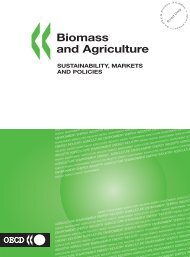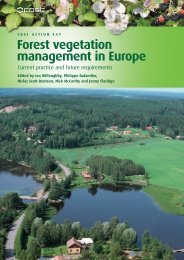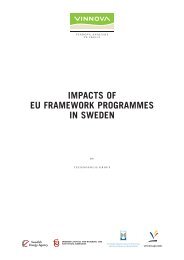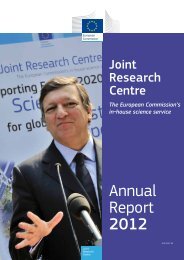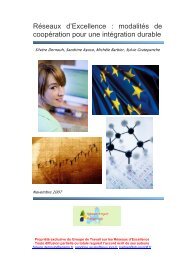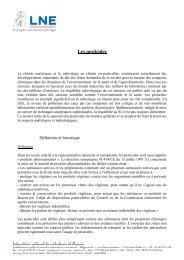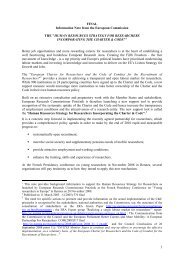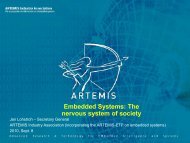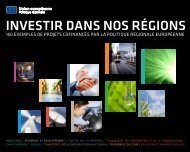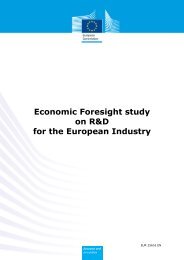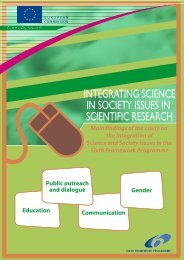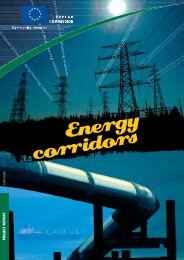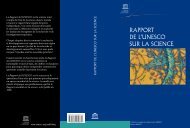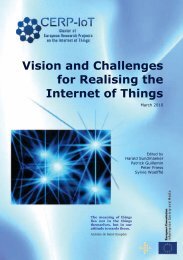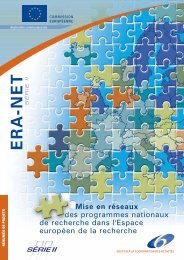OPEN DAYS 2010 Final Programme - European Commission - Europa
OPEN DAYS 2010 Final Programme - European Commission - Europa
OPEN DAYS 2010 Final Programme - European Commission - Europa
Create successful ePaper yourself
Turn your PDF publications into a flip-book with our unique Google optimized e-Paper software.
The <strong>OPEN</strong> <strong>DAYS</strong> University<br />
Tuesday 5 October <strong>2010</strong><br />
Following its successful inauguration during the 2009 edition of the <strong>OPEN</strong> <strong>DAYS</strong>, this year the <strong>OPEN</strong> <strong>DAYS</strong> University will add the<br />
academic point of view on matters related to regional development and EU cohesion policy. In cooperation with international<br />
organisations and associations, the <strong>OPEN</strong> <strong>DAYS</strong> University will host lectures and moderated panels and will provide networking<br />
opportunities and exchanges among researchers and other stakeholders in the area of 'competitiveness, cooperation and<br />
cohesion'. This year, the <strong>European</strong> <strong>Commission</strong>'s Directorate-General for Regional Policy and the Regional Studies Association<br />
organised a competition for early career researchers in <strong>European</strong> regional policy. The winners of this competition will be invited<br />
to present their research in the form of a poster at <strong>OPEN</strong> <strong>DAYS</strong> <strong>2010</strong>.<br />
Urban dynamics: Migration and social mobility<br />
Social and economic polarisation is one of the biggest challenges to face <strong>European</strong><br />
cities over the next twenty to thirty years. Evidence suggests that divisions will<br />
become deeper and increasingly visible, neighbourhood by neighbourhood.<br />
Mass migration has taken place and will continue. The population structures<br />
and shopping lists of necessary/desirable welfare state goods and services have<br />
changed radically and will continue to do so. Spatial population changes pose<br />
huge challenges, especially as some areas are characterised by inflows of people<br />
into increasingly crowded and congested areas, while other areas face economic<br />
decline and ageing populations as the young and highly skilled workers leave.<br />
These issues have serious implications for <strong>European</strong> cohesion policy. This<br />
workshop is about strategies to stimulate the hidden spatial and social dynamics<br />
and their successful implementation. It is jointly organised by the <strong>European</strong><br />
<strong>Commission</strong>, the <strong>European</strong> Urban Knowledge Network and the Regional Studies<br />
Association.<br />
Quality of government at the national, regional and local level<br />
The important role of institutions in regional development is increasingly recognised<br />
by researchers, policy makers and political leaders. Organisations such as the UN,<br />
World Bank and Transparency International have made a high quality of government<br />
and low-level of corruption a top priority. The higher costs of corruption for<br />
businesses and public projects are only a part of the damage inflicted by a low quality<br />
of government. If the judicial system is considered as biased, when accountability is<br />
limited and law enforcement selective, citizens lose their trust in their leaders and<br />
entrepreneurs are less willing to take risks undermining the growth potential of that<br />
region. This workshop will discuss the quality of government in EU Member States<br />
and regions and in its neighbouring countries. In addition, it will show specific<br />
examples of how the quality of government can be improved. Corruption not only<br />
leads to higher costs of doing business and building public infrastructure. It also<br />
fundamentally undermines the trust of citizens, leading to underinvestment.<br />
05UNIV01<br />
09:00 - 10:45<br />
Venue: <strong>European</strong> <strong>Commission</strong>, Charlemagne<br />
building CHAR-S1 (Room Mansholt)<br />
Organiser: <strong>European</strong> Urban Knowledge<br />
Network/Regional Studies Association<br />
Speakers: Alessandra Faggian, Reader,<br />
School of Geography, University of<br />
Southampton, United Kingdom; Atilla<br />
Varga, Professor, Department of Economics<br />
and Regional Studies, University of Pecs,<br />
Hungary; David Bailey, University of Coventry<br />
& Chair of Regional Studies Association,<br />
United Kingdom; Henri de Groot, Professor,<br />
Department of Spatial Economics, Free<br />
University of Amsterdam, Netherlands; Philip<br />
McCann, Professor, Faculty of Spatial Sciences,<br />
University of Groningen, Netherlands<br />
05UNIV02<br />
09:00 - 10:45<br />
Venue: <strong>European</strong> <strong>Commission</strong>, Charlemagne<br />
building CHAR-S2 (Room Jenkins)<br />
Organiser: <strong>European</strong> <strong>Commission</strong>, DG<br />
Regional Policy<br />
Speakers: Bo Rothstein, Gothenburg, Institute<br />
of quality of government, Sweden; Claire<br />
Charbit, Public Governance and Territorial<br />
Development Directorate, OECD, France;<br />
Lucio Guarino, consortium of Municipalities<br />
development and legality, Italy; Miklos<br />
Marschall, Regional Director Europe and Central<br />
Asia, Transparency international, Hungary<br />
<strong>OPEN</strong> <strong>DAYS</strong> <strong>2010</strong> – <strong>European</strong> Week of Regions and Cities 9



